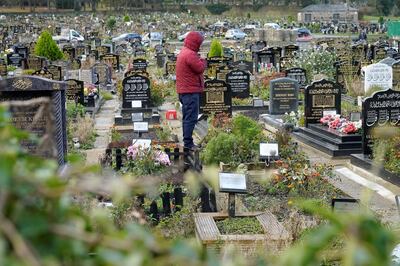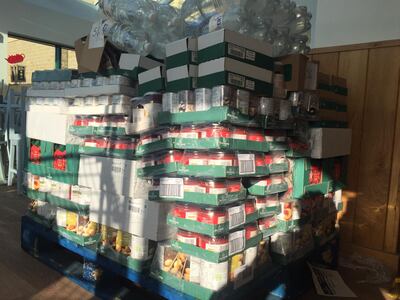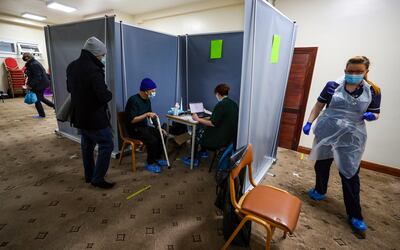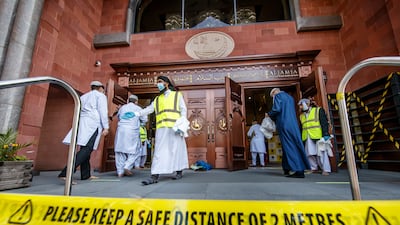When Hisham Al Mahayni left behind his beloved but war-torn Syria to begin a new life with his family in the UK, the last thing he expected was to be caught in the maelstrom of a global pandemic.
With stringent lockdowns amid mounting fatalities, he found himself living in one of the areas hardest hit by Covid-19 – the West Yorkshire city of Bradford.
With a large ethnic minority population and higher than average levels of poverty, health officials knew Bradford was at risk of suffering more than most. Now, five years since the World Health Organisation declared a global health emergency on January 30, 2020, the city is still feeling the impact in many ways, but it has also built on the community spirit generated during the dark times.
Its Muslim cemeteries and hospitals were overwhelmed, its cases and number of deaths were higher than average and it was one of a few places to experience more lockdowns than other parts of the country – in one instance imposed just three hours before Eid as Boris Johnson’s government enacted emergency measures to contain the pandemic.
By September 2021, 1,422 people had lost their lives to Covid in Bradford compared to 881 in neighbouring Barnsley, 943 in Doncaster and 382 in Calderdale. At the end of 2023 it had recorded 190,000 cases, compared to Calderdale's 74,000 and Kirklees' 153,000.

Thank you, heroes
In the midst of this, Mr Al Mahayni and his family had just launched their food business, Kunafa Tea, first from their home and then as a restaurant. “We went from being refugees to business owners,” he said.
“The community showed up time and time again, even nominated us for an award which we won, and we wanted to give something back.” So, when Covid hit, they worked with local charities to feed other refugees and "Covid heroes".
“We gifted meals to staff on Covid wards to thank them for their incredible work. These staff gave up time with loved ones to care for patients and we wanted to make them feel appreciated. As Syrian refugees previously and now British citizens we felt a responsibility … to our local Bradfordian community.”
The family also sent out Iftar food parcels, placing notes thanking workers for their role in caring for the community, adding: “Heroes don’t always wear capes, but they do wear full PPE!”.

The restaurant thrived despite the troubled times and the family have just opened a second restaurant 15 miles away in Leeds, and are supporting mentoring programmes to help other refugees start businesses. “Our restaurant is so much more than just food, it is a gateway to the old streets of Damascus, bridging between cultures and communities,” he said.
Refugee meals
One of the charities they provided food to was the InTouch Foundation, which served meals from a catering van in the city centre. The hundreds of people they had been helping every week turned into thousands when Covid struck.
“We ended up handing out more than 40,000 meals,” founder Osman Gondal told The National. “From starting out with a catering van we ended up moving to actual premises, and the charity has gone from strength to strength.
“We are completely volunteer-run and we found that the faith leaders and businesses all wanted to help us. Kunafa Tea were one of the businesses. Many refugees didn’t have the means to have hot meals so we made up food packs to suit their palate. It was a small idea that really snowballed and brought out the best of humanity.”
'Nothing prepared us'
Dr John Wright was working on the front line at hospitals in Bradford and saw first-hand the devastation Covid wrought. As he watched the death toll rise in China in January 2020, to be followed by distressing scenes of overrun hospitals in Italy, he knew his city would suffer a similar fate.
“We were going through simulations to practise how to put on PPE and how to manage infection control and it all seemed very calm and rational,” he told The National. “When it hit us in March it was so much more quickly than we had anticipated. With the lockdowns and big public health measures, hospitals had to rapidly convert wards into different zones.”
He recognises that they were not prepared. “Pretty quickly we started struggling with lack of testing kits, lack of PPE, lack of scrubs – the whole supply chain broke down. It could not cope with the demand.”

Hotspot
Deprived areas and ethnic minorities suffered the most from the impact of Covid in the UK. In the first year around one in every 537 people in the Bradford area died from symptoms related to Covid. Around a third of Bradford’s 560,000 residents are from ethnic minorities and many live in multi-generational homes, which put elderly relatives at higher risk of contracting Covid. Of all deaths registered in 2020 in England and Wales, 12.1 per cent were due to Covid, but in Bradford the figure was 15 per cent.
That risk factor was recognised fairly early. “We spent a lot of time in the early days trying to encourage safe practices and family safety,” Dr Wright said, highlighting the intertwined nature of inner-city deprivation and links with ethnicity.
“You get higher rates of ill-health, both physical and mental, housing conditions, multi-occupancy housing, overcrowding and poor ventilation, lack of access to green spaces. Transmission increased because of that overcrowding.”
Dr Wright says he is still haunted by the high death toll and the “difficult decisions” they had to make. Within nine months of the outbreak, Bradford had recorded 1,000 deaths. “The number of patients who died has stayed with me,” he said. “It destroyed lives and that is the sadness of it.”

Vaccine breakthrough
Despite the devastation, Bradford was chosen to lead research on vaccines which ultimately led to more lives being saved globally. “We did some of the very cutting-edge drug trials when the first vaccines came out,” he said. Because the population was particularly at risk it was a good place to start. “One of the plus sides of the pandemic was how the UK’s medical research really did trailblaze and we were one of the important sites.”
A major problem Bradford faced was the spread of misinformation, leading to low uptake of the vaccine. Fake news had been spread that made false claims about the safety of vaccines and their efficacy, ingredients and side effects. That led medical staff to open vaccine centres in mosques to try to help dispel some of the fears.
“A breakdown in trust happened fairly quickly as false news rapidly spread through communities,” he said. “I remember a woman who would not come into hospital because she was scared we were going to kill her. I still wonder what happened to her, she was quite sick.
The consequences meant a low vaccination uptake and people who needed it the most were not having it. We see a legacy of that in terms of vaccine hesitancy. There has always been issues of trust in government but not the NHS, and fake news destroyed some of that trust. It needs to be rebuilt.”
Mosque and restaurant clinics
The owners of MyLahore restaurant had worked closely with health workers and were providing meals for schoolchildren and the vulnerable. To help combat vaccine fears, they took the unusual step of opening the UK’s first vaccine clinic in their city centre venue.
“People were dying and we saw that a lot of people did not understand about the vaccine, there was a lot of stigma around it and we wanted to help educate people,” Ishfaq Farooq, director of the MyLahore restaurant chain, told The National.
“Everything shut down overnight. It was a daunting time that no one will ever forget. People were losing loved ones and were unable to go to funerals. We could not pay our condolences. We gave meals to thousands of NHS workers at the hospitals, when someone needed help we never said no.
“We turned the downstairs of the restaurant into a clinic where people could get the vaccine and discuss its benefits and side effects. We got healthcare specialists who spoke different languages to sit down with people and explain. As a result a lot of people took them up. It was really successful. Bradford really came together, it is a very generous city, and we are very proud of what we did.”
Mosques across the city also opened their doors to offer vaccines, and they became the only place in the UK to change the wording of the Adhan call to pray. The Bishop of Bradford, Reverend Toby Howarth, told The National the work of the Council of Mosques in Bradford was trailblazing during Covid, from them holding vaccine clinics to changing the Adhan to tell people to stay at home and pray to keep safe.
“The Muslim community did such creative work around the Covid messaging. They did groundbreaking work,” he said. “Faith communities across the city came together, curry houses provided vast amounts of free meals for emergency workers, the mosques opened as vaccine centres and one church opened 24 hours a day to help distribute food. Bradford now has a new narrative, we have gone from being a city known for not getting along to everyone coming together.”
Learning languages
Afghan refugee Sabiya Khan worked with thousands of asylum seekers and said the language barrier was a major problem during Covid. In her work at the Bradford Foundation Trust, a charity, she visited refugees in hotels and explained the situation and helped them with financial aid, food, clothing and shelter.
“Our work was really crucial,” she told The National. “Refugees and asylum seekers did not understand what was happening. We upskilled volunteers to train as interpreters.
“We spent time delivering information in their own languages. Being able to educate people was very important, from wearing masks to vaccines. These were displaced people who had been through horrific ordeals, did not know the system and had to deal with everything suddenly shutting down.
“We were seeing a rise in homelessness because they did not know how to get housing. They had no social interaction and we had to deal with some suicides. I had volunteers calling people to check they were OK.
“After Covid people struggled to go out and we created well-being hubs which continue. If we had not been there I fear they would have been lost and forgotten. People tell us they will never forget what we did for them. But we just wanted to help.”

Eid celebrations cancelled
Kaneez Khan, associate non-executive director at Leeds and York Partnership NHS Foundation Trust, was given an MBE for her work in helping to shape the government’s strategy on reaching people disproportionately affected during Covid.
In July 2020, three hours before Eid was due to start, the UK government announced last-minute lockdown rules would be imposed in just three areas of the country – Greater Manchester, east Lancashire and parts of West Yorkshire – due to a spike in Covid cases. The restrictions banned separate households from meeting.
“When they locked Bradford down just hours before Eid they sent a message that Muslims were spreading Covid and increased Islamophobia,” she told The National. “I challenged the government on it but the damage had been done.”
It was through her educating the government on how the Muslim community felt that measures were taken to try to address misconceptions surrounding the vaccines. “Our community was worried about going to hospital because they thought they might not come out alive. It was a very scary time,” she said.
Bradford Muslim Women’s Council had been running a weekly Curry Circle to feed anyone in need. Their volunteers hand-delivered meals and carried out welfare checks on those isolating. They went from making a handful of meals to delivering over 400 a week.
“We had stricter lockdowns [than other parts of the UK]. It was heartbreaking, in particular when Eid celebrations were cancelled at the last minute,” Saadia Mushtaq told The National.
“A lot of people faced financial hardship, such as taxi drivers and hospitality workers who lost their income overnight. People had to isolate due to existing health conditions and it was a very lonely time. We set up a helpline for people who needed emergency food or emotional support. Through our work we made long-lasting friendships. It is really humbling to look back and see the difference we made.”

Sunshine and light
For Dr Wright, despite the high death toll, the legacy of Covid in Bradford continues to be the way the community came together in its hour of need.
“It is heartwarming to see what Bradford did,” he said. “We can talk about the tragedy and the harm on vulnerable lives but the moments of sunshine and light were in the NHS’s adaptiveness and flexibility to come together, and the shining example of the community coming together.
“Whether that was clapping [to recognise NHS workers] on a Thursday night or food parcels for the hospital, everybody wanted to help. We saw the community trying to make that happen with mosques, faith leaders, restaurants, everybody pulling together. It’s those moments, and what people did in the face of adversity, that still make Bradford special.”










